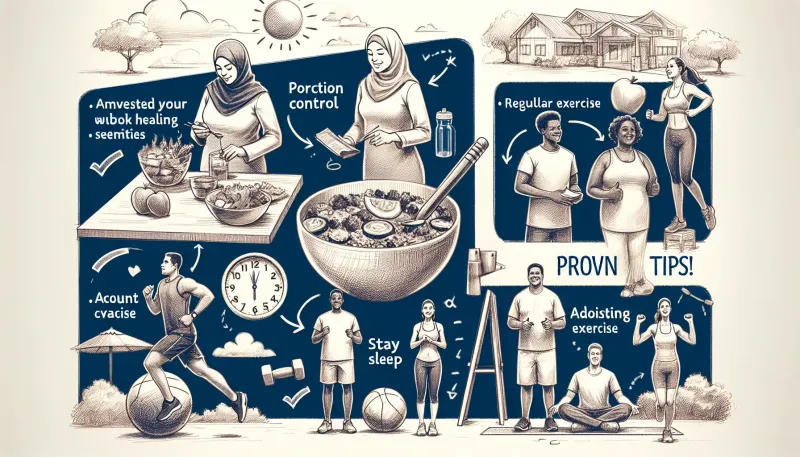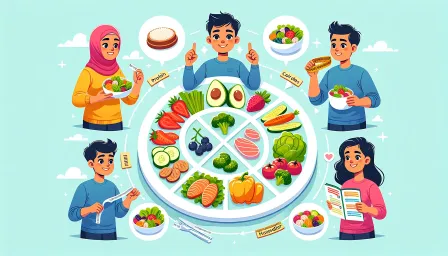Proven Weight Loss Tips to Shed Pounds Fast

Discover effective weight loss tips to help you shed pounds quickly and healthily. Follow our expert advice to achieve your fitness goals.
Embarking on a weight loss journey can be challenging, especially with the overwhelming amount of information available. To help you navigate this journey effectively, we have compiled a list of proven weight loss tips that will enable you to shed pounds fast while maintaining your health. Keep reading to discover expert-backed strategies that can transform your weight loss efforts.
Understand Your Caloric Needs
One of the fundamental principles of losing weight is understanding your caloric needs. Knowing how many calories your body needs to maintain its current weight is crucial. This can be done by calculating your Total Daily Energy Expenditure (TDEE), which factors in your Basal Metabolic Rate (BMR) and your activity level.
Create a Calorie Deficit
Once you know your TDEE, the next step is to create a calorie deficit. A calorie deficit occurs when you consume fewer calories than your body needs, leading to weight loss. Aim for a moderate calorie deficit of 500-750 calories per day, which can result in a healthy weight loss of about 1-1.5 pounds per week.
Track Your Food Intake
Keeping track of what you eat can significantly impact your weight loss progress. Use a food diary or a mobile app to record your daily food intake. This practice helps you become more mindful of your eating habits and ensures that you stay within your caloric limits.
Prioritize Nutrient-Dense Foods
While creating a calorie deficit, it's essential to focus on the quality of the calories you consume. Prioritize nutrient-dense foods that provide essential vitamins and minerals without adding excessive calories. Include plenty of:
- Fruits and vegetables
- Lean proteins (lean meats, fish, legumes)
- Whole grains (brown rice, quinoa, oats)
- Healthy fats (avocado, nuts, seeds, olive oil)
Incorporate Regular Physical Activity
Physical activity is a critical component of any weight loss plan. It helps burn calories, build muscle, and boost metabolism. Aim for at least 150 minutes of moderate-intensity aerobic exercise or 75 minutes of high-intensity exercise per week. Incorporate strength training exercises at least twice a week.
Mix Cardio and Strength Training
Combining cardio and strength training exercises can accelerate weight loss. Cardio exercises such as running, cycling, or swimming help you burn calories, while strength training exercises like weight lifting or resistance training build muscle mass, which can increase your resting metabolic rate.
Stay Hydrated
Drinking enough water is vital for overall health and can aid in weight loss. Water has zero calories, helps control hunger, and boosts metabolism. Aim to drink at least 8 glasses (64 ounces) of water per day. You can also increase your water intake by consuming water-rich foods like cucumbers, watermelon, and celery.
Avoid Sugary Beverages
Eliminating sugary beverages is a straightforward way to reduce calorie intake. Drinks like soda, fruit juices, and energy drinks are high in sugar and can add a significant amount of empty calories to your diet. Opt for water, herbal teas, or black coffee instead.
Get Enough Sleep
Sleep plays a vital role in weight management. Lack of sleep can disrupt hormones that regulate hunger and appetite, leading to increased calorie consumption. Aim for 7-9 hours of quality sleep each night to support your weight loss efforts.
Reduce Stress
Chronic stress can negatively impact weight loss by leading to emotional eating and increased storage of abdominal fat. Incorporate stress-reducing activities into your daily routine, such as yoga, meditation, or deep breathing exercises.
Mindful Eating
Practicing mindful eating can help you gain control over your eating habits. Focus on eating slowly, savoring each bite, and paying attention to hunger and fullness cues. Avoid distractions like watching TV or using your phone while eating.
Portion Control
Portion control is crucial for maintaining a calorie deficit. Be mindful of serving sizes and avoid eating directly from large packages, which can lead to overeating. Use smaller plates and bowls to help control portions and avoid second helpings.
Seek Professional Guidance
If you're struggling to lose weight or need personalized advice, consider seeking professional guidance. A registered dietitian or a certified personal trainer can provide tailored recommendations based on your specific needs and goals.
Regular Check-Ins and Accountability
Regular check-ins with a professional or a support group can help keep you accountable and motivated. Sharing your progress and challenges with others can provide valuable insights and encouragement.
Conclusion
Losing weight requires a combination of dietary changes, physical activity, and lifestyle adjustments. By understanding your caloric needs, eating nutrient-dense foods, staying active, and practicing mindful eating, you can achieve your weight loss goals. Remember, consistency and patience are key. Seek professional guidance if needed, and stay committed to your journey for long-term success.



























